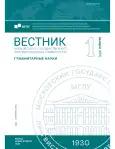Catch up in 60 Seconds: Temporal Features of D. Trump’s Closing Statements in Presidential Debate
- Authors: Sokoreva T.1
-
Affiliations:
- Moscow State Linguistic University
- Issue: No 1(895) (2025)
- Pages: 92-97
- Section: Linguistics
- URL: https://journal-vniispk.ru/2542-2197/article/view/279192
- ID: 279192
Cite item
Abstract
The research is aimed at describing the prosodic features of English political discourse, namely the temporal characteristics of an American politician’s speech during the election debate with his main opponent. The closing statements of US presidential candidate Donald Trump in the course of two presidential debates held this year were used as research material. The results of auditory, electronic-acoustic and statistical analyses revealed the specifics of the temporal organisation of speech in English political discourse presented under time constraints.
About the authors
Tatiana Sokoreva
Moscow State Linguistic University
Author for correspondence.
Email: t.v.sokoreva@linguanet.ru
Russian Federation
References
- Levenkova, Е. R. (2011). Konvergentnye i divergentnye tendencii v politicheskom diskurse Velikobritanii i SShA = Convergent and divergent trends in the political discourse of the United Kingdom and the United States: abstract of Senior Doctorate in Philology. Institute of Linguistics, Russian Academy of Sciences. (In Russ.)
- Petrosyan, N. V., Khamrakulova, F. R. (2022). The concept of ‘political discourse’. European Scholar Journal, 3 (3), 88–91.
- Rahmani, H., Saeed, A. R. (2024). The Power of Language: Exploring the Role of Language in Politics // International journal of research and innovation in social science (IJRISS), 8(8), 2063–2073. https://dx.doi.org/10.47772/ IJRISS.2024.8080152.
- Cybulya, N. B. (2023). Korreljacija intonacii i neverbal’nyh sredstv v jekzazheracii mental’no-jemocional’nyh znachenij (na materiale anglojazychnogo diskursa) = Correlation of intonation and non-verbal means in the exageration of mental and emotional meanings (based on the material of English-language discourse). Сognitive language studies, 4(55), 494–497. (In Russ.)
- Potapova, R. К. (1990). Foneticheskie sredstva optimizacii rechevogo vozdejstviya = Phonetic means of optimizing speech effects. In Optimization of speech effects (pp. 199–210). Мoscow: Nauka. (In Russ.)
- Nadeina, Т. М. (2003). Frazovaya prosodiya kak faktor rechevogo vozdejstviya = Phrasal prosody as a factor of speech influence. Moscow: Institute of Linguistics RAS. (In Russ.)
- Vassyliev, V. А., Katanskaya, А. R., Loukina, N. D. (2009). English phonetics: Practical course. Ed. by Zh. B. Vereninova. Moscow: Higher school.
- Shevchenko, Т. I. (2024). Teoreticheskaja fonetika anglijskogo jazyka = Theoretical phonetics of the English language. Moscow : Urait. ISBN 978-5-534-09050-5. (In Russ.)
- Sokoreva, T. V. (2024). Prosodic characteristics in English and German political discourse as a means of influencing the audience. Vestnik of Moscow State Linguistic University. Humanities, 2(883), 107–113. EDN TRMZZO. (In Russ.)
- Linville, S. E. (2001). Vocal Aging. San Diego: Singular Thomson Learning.
- Chueshkova, А. V., Shevchenko, Т. I. (2023). Language personality and the variability of its prosodic level . Vestnik of Moscow State Linguistic University. Humanities, 1(869), 120–125. 10.52070/2542-2197_2023_1_869_120. EDN TWAGBA. (In Russ.)
- Gorbyleva, А. V. (2023). Kognitivnyj i jemocional’nyj aspekty social’nogo vzaimodejstvija v dialoge = Cognitive and emotional aspects of social interaction in dialogue. Сognitive language studies, 3-1(54), 337–341. (In Russ.)
- Wells, J. C. (2006). English intonation: an introduction. Cambridge: Cambridge University Press.
Supplementary files










